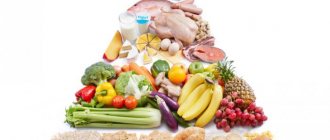Not all representatives of the fair sex dream of losing weight. There are many girls who want to become more feminine, and to achieve this goal they must gain weight. Excessive thinness can cause self-doubt and even lead to deterioration in health. And if for those who want to become slimmer, gaining a couple of kilograms and no more is not a problem, which becomes the main reason for excess weight, then such a “luxury” is often not available to those suffering from excessive thinness. To gain appetizing shapes, they must try no less than those losing weight.
How to gain weight for a girl: action plan
Achieving your goal involves developing a clear action plan that will allow you to quickly gain the desired weight. It comes down to three fundamental points:
- changing eating habits;
- regular strength training;
- revising your lifestyle.
Each requires detailed consideration, clear perception, and application to daily routine. Otherwise, the weight will either remain unchanged or, conversely, begin to decrease.
How to quickly gain weight for a girl
An effective diet for a guy to gain weight: menu for the week
The first day
- Breakfast: 3 scrambled eggs, a sandwich with a piece of boiled pork and cucumber, 1 tomato, several walnuts, tea.
- Snack: banana, tea + bun with poppy seeds.
- Lunch: noodle soup (260 g), one hundred grams of fried chicken, several slices of bread, two hundred grams of salad.
- Afternoon snack: several boiled eggs, one hundred grams of rice porridge, four dried fruits.
- Dinner: 160 g of mashed potatoes, one hundred grams of beef cutlets, several cheese sandwiches, 200 ml of vegetable juice, squeezed at home.
Second day
- Breakfast: one hundred grams of wheat porridge prepared with milk, 150 ml of yogurt, 80 g of curd cheese, tea.
- Snack: 100 g dried apricots, one apple.
- Lunch: 260 g of chicken soup, 160 g of potato ravioli, two hundred grams of carrot and radish salad, seasoned with lemon juice.
- Afternoon snack: 75 g of yogurt with one hundred grams of strawberries or other berries.
- Dinner: 250 grams of baked pike perch with vegetables, 150 grams of tomato and cucumber salad, season the vegetables with sour cream.
Day three
- Breakfast: two hundred grams of buckwheat with milk, an omelette of one egg and two whites, half a glass of milk, toast + 30 grams of hard cheese.
- Snack: pear, 30 g of any nuts, one hundred grams of marshmallows or marmalade.
- Lunch: 200 g of borscht, 150 g of turkey fillet, one hundred grams of vinaigrette and a slice of black bread.
- Afternoon snack: 170 g of cottage cheese, 100 g of yogurt, one peach.
- Dinner: two hundred grams of hake, one hundred grams of green beans, 150 grams of salad from your favorite vegetables. You can also eat a few sandwiches.
RECOMMENDED READING: All about sports nutrition
Day four
- Breakfast: three boiled eggs, pearl barley porridge with milk with honey, nuts and grated apple, one banana, tea.
- Snack: 2 pieces of toast, 40 g peanut butter, green tea.
- Lunch: 260 g of cabbage soup in meat broth, one hundred grams of pasta with meat balls and cheese, vegetable salad dressed with sour cream.
- Afternoon snack: boiled egg, slice of bread + 15 g butter, handful of pine nuts, juice.
- Dinner: 160 g of goulash, 250 g of salad with shrimp (100 g), feta cheese (30 g), lettuce, cherry tomatoes and cucumber, season the ingredients with olive oil.
Day five
- Breakfast: 160 g ravioli, 160 g pasta with boiled chicken fillet, a slice of black bread + butter.
- Snack: two hundred grams of beef goulash, vegetable salad (150 grams).
- Lunch: 260 g of pea soup with smoked ribs, 100 g of boiled pork, cabbage, onion and cucumber salad, seasoned with vinegar.
- Afternoon snack: tea, cheesecake, banana, cookies (amount at your discretion, about 70 g).
- Dinner: 150 g of salmon steak, two hundred grams of grilled vegetables, 130 g of salad from your favorite vegetables.
Day six
- Breakfast: 130 g stewed beef, 130 g pasta, cocoa.
- Snack: 200 g fruit jelly, 120 ml yogurt.
- Lunch: 270 g of zucchini soup, 130 g of rice, boiled chicken breast (half).
- Afternoon snack: a glass of kefir, a handful of cashews.
- Dinner: 150 g of buckwheat with 50 grams of champignons, 100 g of green beans, stewed in tomato sauce.
Day seven
- Breakfast: cottage cheese casserole with raisins, a sandwich with cheese and butter, green tea.
- Snack: 50 g of a mixture of nuts and dried fruits, 200 ml of apple juice.
- Lunch: 250 g of vegetable soup, 150 g of beef liver stewed in milk, tomato and cucumber salad.
- Dinner: 150 g of stewed turkey, 100 g of cauliflower with cheese and mayonnaise, toast, 10 g of butter and tomato juice.
If necessary, portions can be safely increased. This will help a skinny guy gain weight faster. The question that worries many is: how long will it take to recover? Every month you will gain weight by about 1-1.5 kg, provided that you adhere to absolutely all the rules of weight gain.
What lifestyle contributes to weight gain?
Stressful situations and constant depressed mood in naturally thin people are accompanied by the loss of kilograms. Constantly being in a good mood and positive emotions, on the contrary, will help the body quickly adapt and readjust to the fact that you need to gain weight, and not spend existing and incoming energy sources.
No bad habits. Neither large nor small doses of alcohol provide any health benefits. Smoking not only has a detrimental effect on the body, but also speeds up the metabolism. By giving up smoking, gaining the desired kilograms will become much easier. All this is true only when activities that consume excess energy are eliminated.
The latter means that you should refrain from any aerobic exercise. Dancing, running, swimming, aerobics, exercise on bicycle and elliptical trainers require energy expenditure, but have virtually no effect on the growth of muscle tissue, and, therefore, lead to an even greater decrease in volume.
You definitely need to believe in your own strength and success. Having a clear idea that the goal will be achieved is motivating. Otherwise, no results will be achieved. Another important point that should not be misleading is that, of course, it will not be possible to build a beautiful body in one month. It takes much more time, but every change that occurs will bring an incredible sense of satisfaction and make you work further.
Reasons why you don't gain weight
Weight may not be gained for various reasons, including:
- Hereditary factors. In a family where parents and grandparents were thin, a thin girl or boy will most likely be born. Therefore, if your relatives were never chubby, maybe you inherited such a figure from them.
- Poor nutrition. When the human body does not receive enough nutrients, the process of losing weight begins. If you don’t have time to have breakfast, snack on the way to work, and soups and hot dishes are rare guests in your diet, your body may not receive the microelements it needs for full functioning. Be careful, this type of eating usually leads to more serious consequences, including illness.
- Fast metabolism. If you constantly eat high-calorie foods, lead a sedentary lifestyle, and your favorite jeans are still too big, the reason may be an accelerated metabolism. Enhanced nutrition will not help you here; you need a special diet, including the consumption of foods that will slow down the digestion process.
- Stress, depression, poorly organized daily routine. Any troubles in life have a negative impact on your health. If over the past weeks your mood has been bad, and no joyful events have happened in your life, think about it, maybe this is the reason for losing weight.
- Serious illness. Infection or surgery weakens the body, so it needs additional strength and energy to recover. Diseases of the digestive tract, thyroid gland and endocrine glands, as well as the appearance of uninvited inhabitants in the body - worms - are a barrier to weight gain.
Strength training
The pounds you gain represent both fat and muscle tissue. And if you don’t get rid of the former, the result will not be rounded feminine outlines, but folds that will in no way add attractiveness to the figure. This can be avoided by strength training aimed at increasing mass primarily through muscles.
Energy consumption for an hour of strength exercises ranges from 350 to 450 kilocalories, which will not allow weight loss, but will give a significant impetus to the growth of muscle tissue. It is the part of the body that is being worked that will increase in volume. Thus, you can easily adjust your silhouette and the most problematic areas by pumping up your buttocks, abs, calves, and so on. The main thing is to choose the right exercises.
Muscle Growth Factors
The ability and rate of muscle fiber growth are determined by gender, age, genetic differences, duration of sleep and rest, diet and fluid intake.
Overwork and stress can also negatively affect hypertrophy. Research shows that weight training triggers processes in the body that promote hypertrophy:
- mechanical stress – represents damage (microscopic tears) to muscle fibers;
- metabolic stress – triggers biological processes to replenish expended energy;
- compression of blood vessels - hypoxia of the blood vessels of working muscles provokes hypertrophy.
An increase in muscle diameter occurs mainly during the period of rest from training. That is why proper alternation of rest and training is important.
There are two types of muscle fibers - red (slow) and white (fast). The volumetric relief is created mainly by white fibers. Therefore, it is important to focus specifically on “pumping” fast-twitch fibers if you want to build muscle mass.
Nutrition is the basis for weight gain
Without changing your diet, it is impossible to make any progress in weight gain. Weight gain occurs in the body when nutrients are supplied in excess. The surplus is spent on:
- building muscle tissue during strength training;
- support of glycogen and fat depots, which are energy reserves.
Fat deposits, that is, unwanted folds, appear only when nutrition is uncontrolled and vigorous activity is reduced to a minimum. This necessitates the need to perform strength exercises.
You need to consume more calories than you burn during the day. If they are smaller, it is simply impossible to achieve any progress in gaining weight - neither muscle nor fat will increase.
How many calories does it take to gain weight?
Finding the balance point allows you to answer this question - this is an indicator of when the weight remains stable, that is, a person neither gets better nor loses weight. To do this, you need to weigh yourself and eat as usual for a week, counting your daily calorie intake.
Sudden jumps should not be allowed. You need to eat within the same calorie limit every day. You should not deny yourself anything. You just need to strictly count calories, including both main meals and snacks.
After seven days, re-weighing must be repeated. Better at the same time as the first. If the weight has not changed, then the average calorie intake for the week is the equilibrium point at which body weight remains unchanged.
Girls are recommended to gain 500 g per week, that is, approximately 2 kg per month. For some, the figure, depending on individual characteristics, will be a little lower. However, the total increase over 30 days should be between 1 and 2 kg. And if you stick to this course, then over time you will gain the desired weight.
An increase of half a kilo provides an increase in calorie intake. There are no exact recommendations here. For some girls, it is enough to introduce 400 kilocalories into their diet, while for others, even 500 kilocalories is not enough. Finding the exact number can only be done experimentally.
During the first week of starting a “weight gain program,” caloric intake should be increased from the equilibrium point by a minimum of 300 kilocalories. If there is no increase or it is less than 500 g, you should slightly increase the daily caloric intake and so on until the required increase is achieved.
What should the diet be like?
Calories represent the energy expended by the body both to maintain vital functions and systems, and to carry out any physical activity that a person performs. It comes exclusively from the food consumed. The source of energy can be any basic nutrient - protein, fat, carbohydrate.
There are 4 kcal per gram of protein and carbohydrates, and 9 kcal per gram of fat. Therefore, it does not matter what kind of food you eat to gain weight. The main thing is how many calories the body receives along with it. This allows you to eat as balanced as possible and not deny yourself various tasty things, which are mostly carbohydrates.
Principles of weight gain - BZHU ratio
A girl who wants to gain weight, but gain kilograms mainly from muscle tissue rather than fat deposits, should correctly distribute nutrients in her diet.
Squirrels
Training increases the need for protein, but the amount per kilogram of body weight varies from 1 to 2 g per day. Recommendations from sports nutrition manufacturers are a little higher, but they are often driven by the desire to sell a rather expensive nutrient, which is protein.
Its excess is converted into glucose when energy is needed, or excreted when it is not needed. Girls should take an average number equal to 1.5 g per 1 kg of their own body weight. This amount is enough not only to replenish energy costs, but also to build muscle fibers. And if your weight is 50 kg, you need to consume 75 g of protein per day.
Fats
The body needs essential fatty acids and fat-soluble vitamins. If they are excluded from the diet, it leads to health problems. Fears about fats are largely unfounded. Fats contain a large number of calories, which quickly and satiate well. The main thing is to adhere to the daily norm of 20-30% of the total diet. If the daily caloric intake is 1500 kcal, then fats should account for approximately 375 kcal (25%), that is, 42 g (375/9).
Carbohydrates
They represent the cleanest source of energy. Having calculated the amount of protein and fat, the rest of the diet can be safely filled with both slow and fast carbohydrates. The main thing is to stay within calorie limits.
Approximate daily diet
If you consume 1500 kcal per day, and the initial weight is 50 kg, then the nutrients may account for the following ratio:
- Protein: 75 g per day x4 = 300 kcal
- Fats: 44 g per day x9 = 400 kcal
- Carbohydrates: 1600 – 700 = 900 kcal/4 = 225 g per day
Based on this calculation, you can easily calculate your daily caloric intake.
General recommendations regarding nutrition
Nutrient distribution is not the only principle that should be followed when creating a menu for weight gain. It is necessary to drink a large amount of liquid, but not only water, but tea, compote, juice, and so on. Liquid is directly involved in all processes occurring in the body. The main indicator of sufficient moisture is the absence of the feeling of thirst.
You should definitely take vitamins. It is better to give preference to sports ones. If this is not possible, pharmacies will do. The cost for them is different, but it is formed not due to the difference in quality, if the composition is similar, but is determined by the brand. You should carefully study the list and dosages of minerals and vitamins included in the complex.
The diet should include vegetables. They are a valuable source of minerals, vitamins and fiber. Their amount from the daily menu should not exceed 30%. They may not be included in the total caloric intake. The main thing is not to replace the carbohydrates, fats, and proteins necessary for weight gain with vegetables.
The number of meals should be determined based on your own feelings of hunger. You can eat three to six times a day, and make up for missed meals with larger portions. Weight increases not due to frequent snacking, but due to increased caloric intake.
Sports nutrition
Often girls do not have enough time to prepare complete, balanced meals. The way out of this situation is to use sports nutrition.
The following supplements are effective for weight gain:
- Gainer. It is a protein-carbohydrate mixture that helps quickly fill the calorie deficit in the body. To prepare a cocktail, place 2 scoops of powder (80-100 g) in a shaker, add 250 ml of water or juice and shake well.
- BCAA amino acids. Available in the form of capsules, tablets, solutions. Indicated for girls who are unable to obtain the required amount of varied protein from food.
- Creatine. It increases the energy potential of cells, which makes its use justified in situations where there is practically no energy left for training after a hard day at work. The supplement should be taken 30-40 minutes before class in the dosages indicated on the package.
- Protein. The easiest way to get your daily protein intake. However, protein shakes should not be used as a substitute for a full meal.
Girls should keep in mind that using sports nutrition without diet and hard training is useless.











